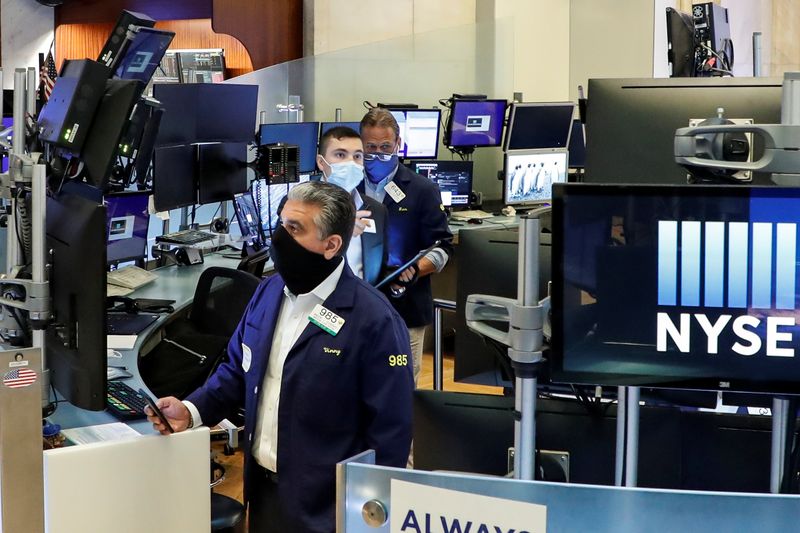Gold prices hit 4-month high on Fed easing hopes, tariff uncertainty
By Geoffrey Smith
Investing.com -- Global progress on taming Covid-19 diverges more and more as President Joe Biden doubles his vaccination target. Personal income and spending data are due, while the ongoing blockage of the Suez canal may focus more attention than usual on monthly retail and wholesale inventories numbers. WeWork is to go public via a SPAC after a big haircut for early investors, and the Fed is lifting limits on bank stock buybacks. Here’s what you need to know in financial markets on Friday, March 26th.
1. Covid divergence widens as Biden doubles vaccination target
The world’s progress in containing the Covid-19 pandemic is faltering, with regional performance diverging ever more sharply.
The U.S. appears the likeliest to join China in bringing the disease under control, even though new infection rates appear to have bottomed out in recent days. President Joe Biden accelerated his timetable for vaccinating the U.S. population in his first press conference on Thursday, saying he’s now targeting 200 million jabs in his first 100 days. The initial target of 100 million was reached with 100 million to spare.
In the European Union, however, infection rates continue to climb in all of the big economies north of the Alps. German Health Minister Jens Spahn warned Friday of “clear signs” that the latest wave of Covid-19 will be worse than the first two. That contrasted with a stronger-than-expected rise in German business confidence in March: the Ifo index hit its highest in 2 ½ years.
Case numbers also continue to rise sharply in India and South America.
2. Personal income, spending data due
Fresh data are set to show the effects of the latest round of stimulus checks passing through the economy like a pig through a python.
U.S. Personal income and personal spending data for February are due at 8:30 AM ET (1230 GMT): income is expected to have fallen 7.3% after a 10% rise in January, while personal spending is expected to have fallen 0.7% after a 2.4% rise last month.
There will also be the latest price index for personal consumer expenditures, the Fed’s preferred measure of inflation, as well as the Michigan Consumer Sentiment survey.
3. Stocks set to open higher; WeWork set to go public via SPAC
U.S. stock markets are set to open modestly higher later, but not by enough to leave them in the green for the week. Nasdaq 100 futures are set for their fifth red week in six despite showing 0.5% higher as of 6:15 AM ET.
Dow Jones futures were 77 points, or 0.2% higher, while S&P 500 futures were up 0.3%.
In focus later may be Berkshire Hathaway (NYSE:BRKa) stock, after Warren Buffett’s company pitched an $8.3 billion plan to build emergency backup power generation in Texas to state regulators.
Also of note – office rental startup WeWork has agreed to be taken public via a Special Purpose Acquisition Company, the BowX Acquisition Corp (NASDAQ:BOWX), at a value of around $9 billion including debt, according to The Wall Street Journal. That’s less than 20% of the valuation it had in a private funding round in 2019, before its abortive attempt at a traditional IPO.
4. Fed to end bank payout restrictions
The Federal Reserve signaled that any risk to the stability of the banking system from the pandemic has peaked. It said on Thursday it will lift the restrictions on most banks’ dividends and stock buybacks that it imposed at the start of the pandemic.
After booking tens of billions of dollars in provisions against possible credit losses, banks posted a sharp rebound in profit in the third quarter before appearing to wobble again in the final quarter of 2020.
The bans will lift on June 30, but will stay in place for another three months for any bank deemed to have a capital shortage in the Fed’s current round of stress tests, results of which are also due at the end of June.
The news comes a week after the Fed effectively ended a temporary relaxation of capital rules for banks that was also instituted at the start of the pandemic.
5 Oil rebounds; Suez blockage set to last until next week
One of the world’s most important waterways is set to remain blocked at least until the middle of next week, according to various reports.
A high tide expected on Saturday will likely not be enough to free the stricken Ever Given container ship, which is jammed against the side wall of the Suez Canal, the reports suggested.
Bloomberg reported that the number of ships awaiting entry to the Canal has now risen to over 300 from 185 on Thursday. That is likely to lead to considerable disruptions to supply chains of everything from oil and liquefied natural gas to plastics and pulp. Crude oil futures were up over 1.5% overnight, but still on course to end the week slightly lower.
The ongoing problems in Suez may add more interest than usual on U.S. retail and wholesale inventory data, which are due at 8:30 AM ET.
